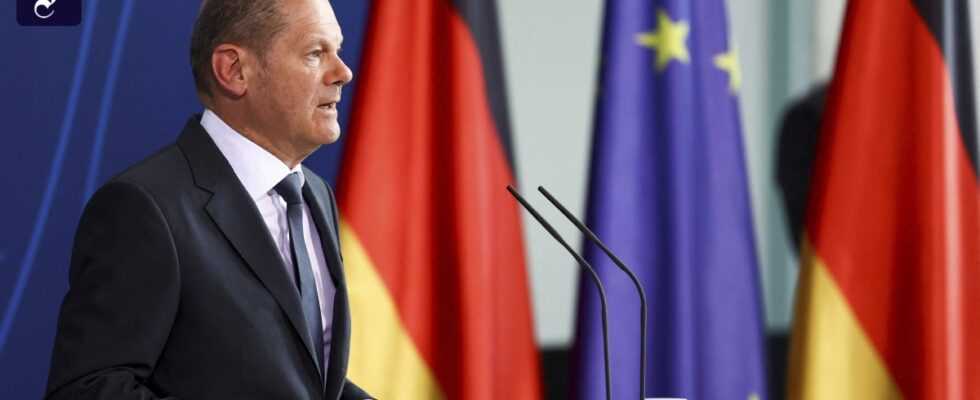BUndecancellor Olaf Scholz sees no reason to change German policy on military support for Ukraine. After a switching conference with the heads of state and government of the United States, Great Britain, Italy, France and Poland, among others, Scholz pointed out on Tuesday evening that arms deliveries had to be “quickly implemented” and the device “quickly deployed”. The chancellor tried to evade pressure from his coalition partners, who are increasingly impatient in demanding that Ukraine be supplied with heavy weapons. In the Federal Chancellery, Scholz said that the other G-7 countries had “come to conclusions similar to ours”.
The chancellor admitted that the war had “entered a new phase” with Russia’s “anticipated offensive” in eastern Ukraine. He stated that Germany wanted to continue supplying arms to Kyiv, but that the Bundeswehr, which had to maintain the country’s defence, had no more stocks that it could hand over. Ukraine was therefore asked to select the equipment it needed from a list of available armaments from German armaments companies. Germany had shown itself willing to pay for these deliveries by increasing its financial military aid.
Scholz also stated that the federal government wanted to help those Eastern European NATO partners who still had weapons systems from the Warsaw Pact era in their army stocks, which they could pass on to Ukraine and for which they then needed replacements from Western production.
Union criticizes government hesitation
The pressure on Scholz had previously increased. There are increasing calls from inside and outside the governing coalition to organize and release the delivery of heavy military equipment to Ukraine. Both the designated FDP General Secretary Bijan Djir-Sarai and leading foreign politicians from the Union opposition called on Scholz to make quick decisions on Tuesday.
SPD chairwoman Saskia Esken, on the other hand, stated that Scholz was holding further talks about possible deliveries of heavy weapons. Esken also announced that she was planning a meeting with Ukrainian Ambassador Andriy Melnyk this Wednesday. A misleading message on Twitter initially gave the impression that the meeting had already taken place on Tuesday.
The Union accused the federal government of not acting decisively enough. Deputy Union faction leader Johann Wadephul told Reuters agency that the current conflict “is also being decided by political determination, and that is lacking”. If Germany hesitates to provide decisive military aid, it stands “with half a foot on Putin’s side”. The statement by SPD leader Esken that Germany had already agreed to the delivery of Czech army tanks to Ukraine, which had once been used by the East German NVA, was called Wadephul “almost cynical”.
He said: “We have heavy weapons at our disposal in Germany ourselves. We have to push the limits of what you can do yourself.” Wadephul said Germany, unlike the United States and Britain, is falling well short of its potential. The government must understand that Germany is seen as a central country in Europe and that corresponding actions are expected.
Wadephul: Increase in funding Diversionary tactics
The chairman of the Union parliamentary group in the Foreign Affairs Committee, Roderich Kiesewetter, praised the announcement by the federal government last Friday on ZDF on Tuesday that it would make more than one billion euros available to Ukraine for the purchase of weapons. Kiesewetter continued: “But you can’t buy your freedom.” Rather, it’s about “supplying infantry fighting vehicles or artillery systems.”
